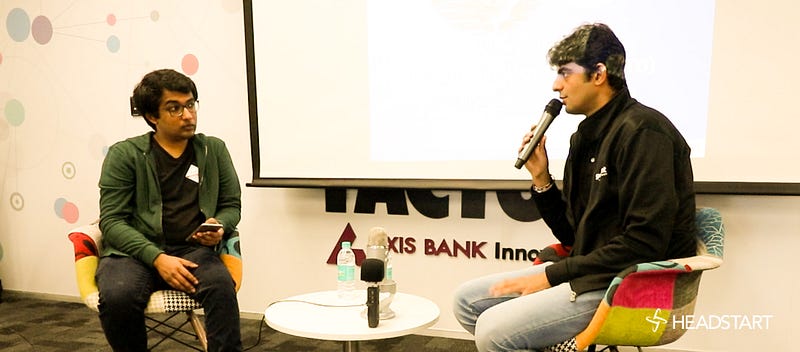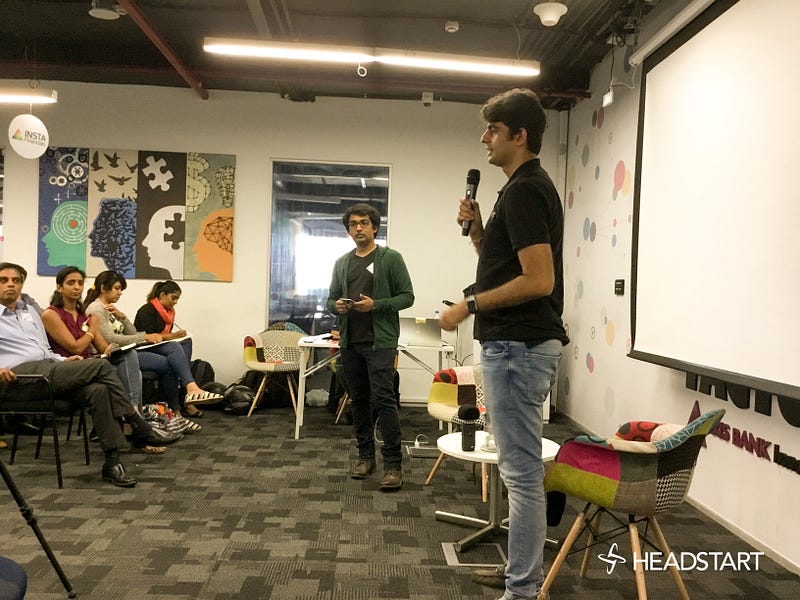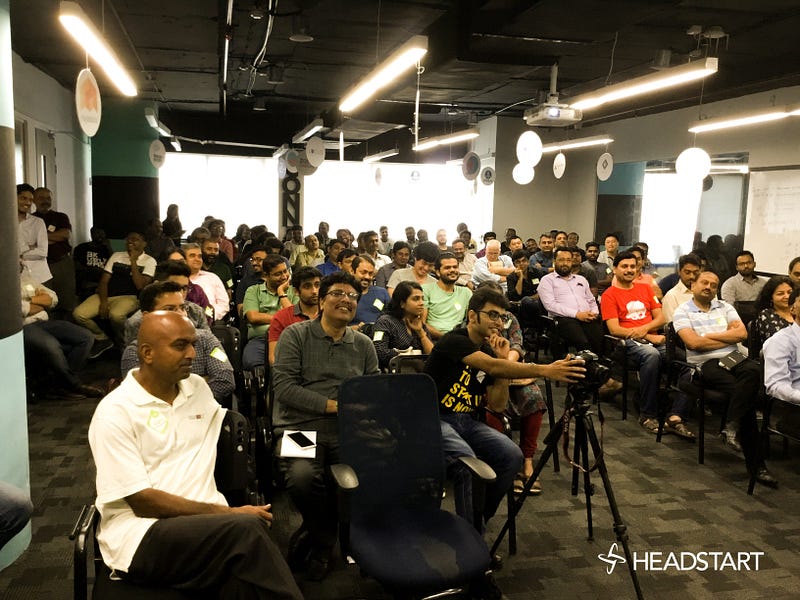Vikalp Sahni, co-founder & CTO, shares how Goibibo, a small startup took over the Indian travel market…
How do you go about competing with an organisation that has been around for over 8 years before you, and then beating them at it by becoming one of the front-runners in the travel industry?

Started in 2007, Goibibo has been disrupting the travel segment as we know it; pioneering several new initiatives, including the much talked about MakeMyTrip merger, in order to provide a seamless travel experience to its customers.
What keeps them driven and how have they been able to achieve so much in such a short span of time?
In order to understand this, Atish Udayashankar, Founder of Skapari spoke with Vikalp Sahni, Co-founder & CTO of Goibibo, in a no-holds-barred interview, at the September 2018 edition of Startup Saturday conducted by Headstart.
How did you get your first 1000 customers and how long did it take to reach that milestone?
We started off like every other company by investing in Google search ads to ensure customers start transacting. We were fortunate enough to have been solving the right problem for our customers, as within 2 months we were able to reach the 1000 customer mark.
What I clearly remember about those initial days, is my call to our very first customer who had booked a flight from Bagdogra to Delhi to find out about his booking experience. His response was simple — he did a google search, saw our ad and completed the booking procedure.
When I told him he was our first customer, his reaction was “Oh My God! Is it going to be alright?”
I, of course, assured him that he will not face any problems on the flight.
We also worked on a few growth hacks to incentivise our existing customers through cash-backs and promo-codes. We put our initial investments into our users so that they come back to us.
Additionally, we also put a lot of effort into customer support so that each customer has a smooth transaction.
What made you take on a big player like MakeMyTrip which was already a big player with 7 years of experience behind them? How did you go about it?

Flight booking was a slow, tedious process and it took almost a minute for a page to load. We focused on building one key differentiation of being the fastest flight booking site in India.
We developed and tested our product against MMT and Cleartrip from the start. In fact, my other two co-founders Ashish and Sanjay would open each of these other sites and we would try to book a flight for the same destination, and if Goibibo was slower, we’d have to go back to the drawing board.
Initially, even I was skeptical if we could make an impression with this small differentiation. But it works. Look at how Gmail overcame Yahoo or the small changes that WhatsApp is making to its product. It is these small changes that make all the difference to the customer. We also focused on being reliable, offering the right price and the right selection.
Once we had our initial set of customers, we brought in several growth hacks like our wallet strategy with the Go-Cash currency and our referral program — Go-Contacts — to provide a better experience for our customers.
Another innovative hack we did was to create an algorithm that would offer flights that are cheaper but would be of longer duration. So customers looking for a better price had an additional option. These kinds of innovative hacks in price and selection helped build a strong differentiation for us.
What made you expand into the hotel and bus segments? How did you leverage network effects to grow these verticals?
We looked at a lot of case studies before entering these markets. Flights are a consolidated market. There are about 7–8 flight operators in India, and as aggregators, there’s only so much you can do.
On the other hand, buses and hotels are very fragmented markets and we wanted to use our capabilities as tech experts to solve the problem of these fragmented markets. Big brands like Uber and Airbnb are also solving problems for fragmented markets.
As tech guys, we knew we could build products that would create value at both ends of the spectrum; from consumers who are buying flights, hotels and buses right up to hoteliers and bus operators who are catering to these customers. We leveraged the network effects between customers, bus operators and us on an individual use case basis to further grow the business.
We also introduced Go Cash currency through which we created a Customer To Customer (C2C) effect. Eventually, we became an end-to-end solution provider and not just middlemen.

In 2013, you acquired redBus, what was the thought process behind the acquisition? What do companies look for in startups they plan to acquire?
We always appreciate great products, especially products that scale well. After flights, we picked up buses as our next story. At that time, we were working with redBus as one of our service providers so we knew that this was a big vertical.
Initially, we contemplated if we should compete or find a way to collaborate. Our investors, Naspers, also had great faith in our vision and were willing to support us. It was at one of our off-site meetings in Goa that we had a serious discussion on this.
At that time, redBus was solving consumer problems, getting good reviews, finding network solutions, and doing everything right to ensure positive growth. That’s why we decided it would be good to merge and I can easily say that this was one of the best decisions we’ve ever taken.
The first thing we usually look for in a startup we’re considering a merger with is what problem they’re solving for the consumer, and whether the consumer is in the centre of it.
The team is another big deciding factor, they have to be passionate enough to drive growth. A good example of this would be the app ‘ Where is my train’ where a team of 6–7 passionate people dedicated themselves to solving one simple problem — how to make sure the train timing is as accurate as possible.
In a snapshot — we look for a passionate & dedicated team that delivers on product, technology and consumer value.
What is the framework you use when deciding to enter a market?
It’s all about focusing on a problem. If you see that there is a problem, however small it is, and try to solve it — there itself is an opportunity.
For example — Yahoo mail was around before Gmail but today Gmail is much more popular because they were able to make the email experience a tad better.
We look at the problem more than the industry. That’s how we entered the search and social segment and that’s how we started the flight business. As a consumer, we felt there was a problem while booking flights.
While there’s a lot of talk about the fintech and e-commerce space, try to focus more on specific problems of consumers within these segments to create a really useful product or solution.
In 2017, after years of competing with each other Goibibo and MakeMyTrip decided to merge. What led to that decision?
Before the merger, MMT had a market cap of 900 million dollars and after the merger, we’ve touched a market cap of 4 billion dollars.
Being rivals and highly driven companies, both of us were competing real hard against each other. And MakeMyTrip was way ahead of the rest of the competition.
We could either keep competing with each other or start creating real value for our customers. That’s when we thought of a merger. It was not to aid in cost-cutting or optimising resources, but a very clear vision to focus on building a better product to create value for our shareholders, customers, and the overall ecosystem.
We hope to be the first among many to have started consolidation of value creation in the internet ecosystem rather than creating a competition bloodbath.
Today, ML, AI, VR/AR are the popular buzzwords being thrown around in the industry. Is Goibibo planning on using these technologies?
VR already has a lot of takers in the travel space, including opportunities for collaborations, as they act as enablers in creating unique experiences for our customers.
AI and machine learning are vital and will be used in several consumer experience touchpoints.
At Goibibo we’ve created our own chatbot persona called Gia, which is active on WhatsApp and Facebook messenger. We’ve given her over 60,000 good use-cases in order to help provide the best interactions with our consumers.
On machine learning, we’re doing a lot on optimisation on our platform. Earlier results were rule-driven, now its all learning driven. This way we’re able to give better product experiences to our customers.
Also, the UI and UX of the platform matter a lot. AI is not yet evolved enough, so you must build the product, engineering, and UX. All these factors together offer the best customer experience. UI and UX help solve problems that engineering or AI cannot solve.
What advice would you like to give existing startups of today?
There are two things; one is skill — you have to be skilled enough to build the product. And the other is the attitude — it’s not always about being the best, but also about being empathetic towards the team you’re working with and the consumers you’re solving the problem for. This attitude is the X-factor that will take you till the end.
